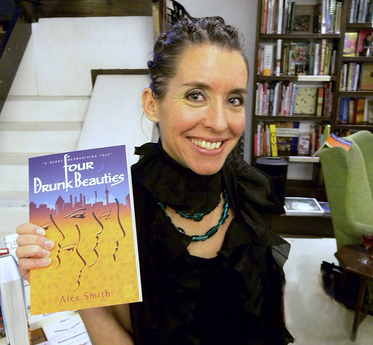Narrative point of view, or POV for short, is the most crucial aspect of a story’s structure. Perhaps the easiest way of understanding POV is to think of your story as a movie and ask yourself, ‘Who holds the camera?’ This person’s knowledge and view of events will determine how your story unfolds.
BY ALEX SMITH
The four narrative POVs
As a writer, you are not necessarily limited to choosing a single POV for your story (and we will discuss the possibility of using multiple perspectives later). But for now, let’s keep things simple and assume you will write from just one perspective.
Now that’s settled, you have four options: first person, limited third person, omniscient third person or second person. At the end of this article, there is a little test to see if you can determine which extract matches which POV.
First person
If you choose to write in the first person, you’re going to give one character the camera. This will be the character you care most about – the protagonist – and they will tell the story using first-person pronouns (‘I’/‘me’/‘my’/‘our’). Thus, the reader experiences events exactly as the protagonist does.
For example, imagine you have three characters in a story – a wife, a husband and an assassin. Let’s see what happens when the wife holds the camera:
I feel anxious. My footsteps echo down the passage, which is lined with photographs from our ‘happy’ wedding day. We are Mr and Mrs Harold James. My new husband left in a rage and in a hurry. He has been gone for hours. He is angry that I will not transfer my inheritance to our joint bank account. He thinks I’m a fool, but he will learn that I’m more than a pretty face. I expect he is drinking away his sorrows in the bar down the road.
If her husband is not at the bar as she assumes, but has instead gone to meet with the assassin, she will not be aware of this – and by extension, neither will the reader. Later in the narrative, she may learn about the meeting from another character who witnessed it. But until then, both she and the reader are in the dark.
Eleanor Oliphant is Completely Fine by Gail Honeyman is a great example of a first-person work of fiction, and memoirs, such as Elizabeth Gilbert’s Eat, Pray, Love, are always written in the first person because they reflect the author’s real-life experiences.
Who do you want to hold the camera?
Deciding who holds the camera dramatically changes the tone of what you write and how events unfold. To illustrate, let’s take the camera from the wife and give it to the assassin:
Another of these greedy men came to see me today. I have no sympathy for him. He wants his wife bumped off. He wants her money. I have no sympathy for her either. I am a professional.
Do you like the assassin? Would you want to write a whole novel from his perspective?
Limited third person
If you write in the limited or close third person, it’s as though you are holding the camera, but you can only follow a single character. For example, J. K. Rowling uses the limited third person in her Harry Potter series, shaping the narrative through Harry’s perspective.
In our example, if you focus the camera on the wife, your view will be limited to what she knows and experiences. This is similar to the first-person POV, but you will use third-person pronouns (‘she’/‘her’/‘hers’) to describe her thoughts, feelings and actions:
She feels anxious. Her footsteps echo down the passage, which is lined with photographs of their supposedly happy wedding. They are Mr and Mrs Harold James. Her husband left in a rage and in a hurry. He has been gone for hours. He is angry because she would not transfer her inheritance to their joint bank account. She believes he is in the local bar, drinking away his sorrows. She believes he thinks she is no more than a pretty face.
Omniscient third person
In the omniscient or general third person, the view is wider. It’s like giving the camera to an all-knowing observer who can see and follow all the characters and knows what each of them is thinking. In our story, an omniscient third-person view of the scene might look like this:
It is widely known that men of no fortune often hone in on women of great means. And in this manner, Harold James, who did not much like his new wife, found he liked her less every day since she had refused to share her money with him. Alicia James née Getty, was pretty but not a fool and although she feared her husband’s strength, she had no intention of allowing him free rein with her money. And so it was that Harold found himself knocking on the door of Everready Roger, whose reputation was based on his perpetual willingness to remove unwanted citizens. Everready did not like people but he did like money, and so he never had a problem with killing for cash. Thus, while Alicia imagined her husband to be drinking away his sorrows, he was, in fact, selecting from a calendar on the desk of Everready Roger a good date for her demise.
In this scene, the view provides insight into the perspectives of all three characters and it shows what everyone is up to at the same time. When writing fiction, the omniscient third person is the most flexible choice, giving you the scope to explore the experiences of many characters in your story.
Second person
This is an experimental perspective and is seldom used. As such, it can come across as gimmicky unless expertly written. The second-person POV points the camera at the reader and casts them as the character, using ‘you’. For example, let’s make the reader the assassin:
Another of these greedy men came to see you today. You have no sympathy for him. He wants his wife bumped off. He wants her money. You have no sympathy for her either. You are a professional.
Single versus multiple POVs
Now that you know more about the different narrative POVs, it’s useful to keep in mind that novels, and even short stories, can be told from more than one perspective. Using multiple POVs means that alternating chapters or sections of your story will reflect the experiences of different characters and can span various timelines.
For example, in The Girl on the Train by Paula Hawkins, the story is told from the perspectives of three different women. In Cloud Atlas, David Mitchell deftly balances six narrators, each existing in a different era – a style that very few writers could emulate.
If you are a debut novelist, however, think twice before you adopt this approach. It can be complex and challenging, as you will essentially be writing multiple novels at the same time!
Playing with POVs
In the wonderful world of storytelling, the power of POV cannot be overestimated. Selecting the right POV for your story lays the foundation for a captivating narrative, ensuring readers are fully absorbed by your characters and immersed in the world you’ve crafted. By understanding the role of POV and exploring different perspectives, you will enhance your power to write excellent stories.
A little test
To close off, here’s a little test – see if you can correctly identify which POV matches each of these paragraphs. Answers are provided far below.
Extract one
There was a garden fork sticking out of the dog. The points of the fork must have gone all the way through the dog and into the ground because the fork had not fallen over. I decided that the dog was probably killed with the fork because I could not see any other wounds in the dog and I do not think you would stick a garden fork into a dog after it had died for some other reason, like cancer for example, or a road accident. But I could not be certain about this.
I went through Mrs Shears’ gate, closing it behind me. I walked onto her lawn and knelt beside the dog. I put my hand on the muzzle of the dog. It was still warm.
– Mark Haddon The Curious Incident of the Dog in the Night-Time
Extract two
In the shop window you have promptly identified the cover with the title you were looking for. Following this visual trail, you have forced your way through the shop past the thick barricade of Books You Haven’t Read, which were frowning at you from the tables and shelves, trying to cow you. But you know you must never allow yourself to be awed, that among them there extend for acres and acres the Books You Needn’t Read, the Books Made For Purposes Other Than Reading, Books Read Even Before You Open Them Since They Belong To The Category Of Books Read Before Being Written. And thus you pass the outer girdle of ramparts, but then you are attacked by the infantry of the Books That If You Had More Than One Life You Would Certainly Also Read But Unfortunately Your Days Are Numbered. With a rapid maneuver you bypass them and move into the phalanxes of the Books You Mean To Read But There Are Others You Must Read First, the Books Too Expensive Now And You’ll Wait Till They’re Remaindered, the Books ditto When They Come Out In Paperback, Books You Can Borrow From Somebody, Books That Everybody’s Read So It’s As If You Had Read Them, Too.
– Italo Calvino If on a Winter’s Night a Traveler
Extract three
He is at pains not to be late with the rent because he is in the flat under false pretences. When he signed the lease and paid A. & B. Levy the deposit, he gave his occupation not as ‘Student’ but as ‘Library Assistant,’ with the university library as his work address.
It is not a lie, not entirely. From Monday to Friday it is his job to man the reading room during evening hours. It is a job that the regular librarians, women for the most part, prefer not to do because the campus, up on the mountainside, is too bleak and lonely at night. Even he feels a chill down his spine as he unlocks the back door and gropes his way down a pitch-dark corridor to the mains switch. It would be all too easy for some evildoer to hide in the stacks when the staff go home at five o’clock, then rifle the empty offices and wait in the dark to waylay him, the night assistant, for his keys.
– J. M. Coetzee Youth
Extract four
Mr. Bingley had soon made himself acquainted with all the principal people in the room; he was lively and unreserved, danced every dance, was angry that the ball closed so early, and talked of giving one himself at Netherfield. Such amiable qualities must speak for themselves. What a contrast between him and his friend! Mr. Darcy danced only once with Mrs. Hurst and once with Miss Bingley, declined being introduced to any other lady, and spent the rest of the evening in walking about the room, speaking occasionally to one of his own party. His character was decided. He was the proudest, most disagreeable man in the world, and everybody hoped that he would never come there again. Amongst the most violent against him was Mrs. Bennet, whose dislike of his general behaviour was sharpened into particular resentment by his having slighted one of her daughters.
Elizabeth Bennet had been obliged, by the scarcity of gentlemen, to sit down for two dances; and during part of that time, Mr. Darcy had been standing near enough for her to overhear a conversation between him and Mr. Bingley, who came from the dance for a few minutes, to press his friend to join it.
– Jane Austen Pride and Prejudice
Answers:
Extract one: first person
Extract two: second person
Extract three: limited third person
Extract four: omniscient third person

About the Author

Alex Smith is the author of two magic real novels Algeria’s way and Four Drunk Beauties, two YA fantasy novels, Agency Blue and Devilskein & Dearlove, a memoir, Drinking from the Dragon’s Well, about teaching English in Wuhan, China, and a series of middle-grade novels translated into African languages and prescribed as set works in South African schools.
Her short stories have been published in journals and anthologies in the UK, South Africa, Ireland, Germany and Sweden. She has won the Nielsen Booksellers Choice Award and the Sanlam Youth Literature Award. Alex was shortlisted for The Caine Prize for African Writing, was a finalist in the NLDTF/PANSA Festival of Contemporary Theatre Readings and, on the recommendation of author Andre Brink, was a candidate in the Rolex Mentor & Protégé Arts Initiative.
Alex tutors the Novel Writing Course, the Literary Short and Flash Fiction Course, and the Memoir Course at the Writers College.













